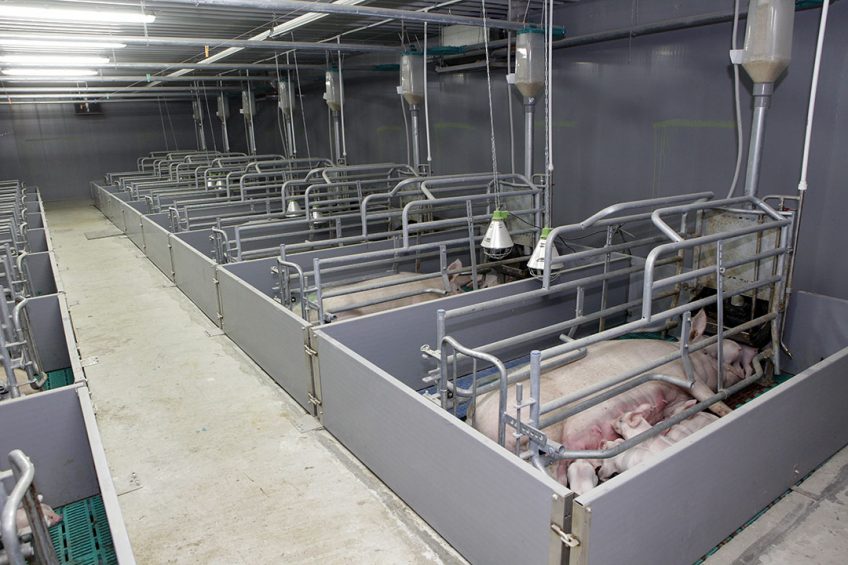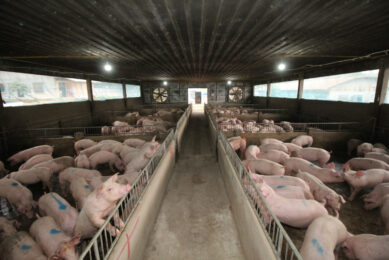ASF Russia: Over half a million pigs culled this winter

Around 560,000 pigs have been culled on various commercial swine farms in Russia during the colder autumn and winter seasons in an attempt to keep African Swine Fever (ASF) outbreaks under control.
That number was confirmed by Sergey Yushin, CEO of Russia’s National Meat Association in personal correspondence. He said that this amount corresponds to roughly 2.2% of the total pig inventory in Russia. A large part of the affected farms are located in Tver and Kursk regions. Other areas with large infected farms were Voronezh, Samara and Tambov regions.
ASF cases in Tver region, Russia
Bezhetsky district, Tver region, about 300 km north of Moscow, was 1 of the districts that was hardest hit, with at least 5 large commercial farms infected in November and December. According to data by the World Organisation for Animal Health (OIE), at least 291,000 pigs had to be culled on these 5 facilities. The facilities belong to the Coral group; each had at least about 50,000 pigs on-site.
ASF cases in Kursk region, Russia
A 2nd notable cluster of outbreaks was found in Fatezhsky and Zheleznogorsky districts of Kursk region, about 500 km south of Moscow. Here also, at least 5 commercial farms were hit by ASF in November and December, leading to the depopulation of at least 125,000 pigs. The farms had a size between 10,000 and 38,000 animals.
In addition, in late January 2021, 2 farms with in total over 26,000 pigs in Bondarsky district, Tambov region, had to be depopulated at 500 km south east of Moscow.
The unfortunate chain of events started early October 2020 with the depopulation of a 35,000 head swine farm in Kalacheevsky district, Voronezh region, 750 km south of Moscow. That was followed late October 2020 a farm with 3,300 pigs was found affected in Bogatovsky district in Samara region, which is more than 1,100 km east of Moscow.
More recent data are currently fairly difficult to obtain as the OIE is doing large maintenance work to its website. The cases mentioned above were not communicated in Russian media.

Last year, Pig Progress interviewed Sergey Yushin on Russia’s new role on pork production
ASF control system is not flawless
On another note, Russia’s ASF control system has received some criticism of late. Russian scientists have claimed that it is clear that not all ASF outbreaks eventually end up in official statistics. That was proven at a recent outbreak in Stavropol Krai, where veterinary officials discovered 11 carcasses of dead pigs near a federal highway between the cities Stavropol and Astrakhan. The Russian law enforcement agencies initiated an investigation, but it was clear that the pigs were thrown dumped, effectively obscuring the outbreak.
No point in protecting pigs
The scientists warned that, to some extent, the number of ASF outbreaks remains high because, for many producers, there is no point in protecting their animals from the disease. In a press statement, Alexander Shvetsov, chief researcher of the Russian federal centre for animal welfare, said, “Farmers weigh risks of ASF penetration rationally. They are well aware that the virus poses no threat to them personally and to other types of their agricultural animals, and they would claim compensation for culled pig. Therefore, given the existing circumstances, substantial costs needed to establish and maintain security measures make no economic sense to them.” He added that this means that the risks of further ASF spread in Russia in 2021 remains high.
ASF virus again on the grocery shelves
ASF virus has also kept finding its way to the grocery shelves. Those cases are not reflected in Russia in the official statistics on the ASF outbreaks. Several product batches containing the ASF genome have been discovered in different parts of the country during the past few weeks. In the Bashkortostan republic, for instance, nearly 688 kg of meat with the ASF genome has been distributed throughout the regional retailers. The products have been reportedly supplied by a Belgorod-based pork producer. It is unknown how much contaminated products were consumed by local citizens, but Rosselhoznadzor reported that 511 kg was destroyed through incineration.

Track the movement of African Swine Fever For everything you need to know about ASF, from the latest outbreaks to controls stay up to-date…
Rostov region: ASF in sausages
Another similar case occurred in Rostov region, where the ASF genome was discovered in a batch of sausages. Rosselhoznadzor said that it was putting a lot of effort into finding and seizing all illegal products. No information on how much contaminated products hit the retail shelves have been given.
Co-author: Vladislav Vorotnikov












